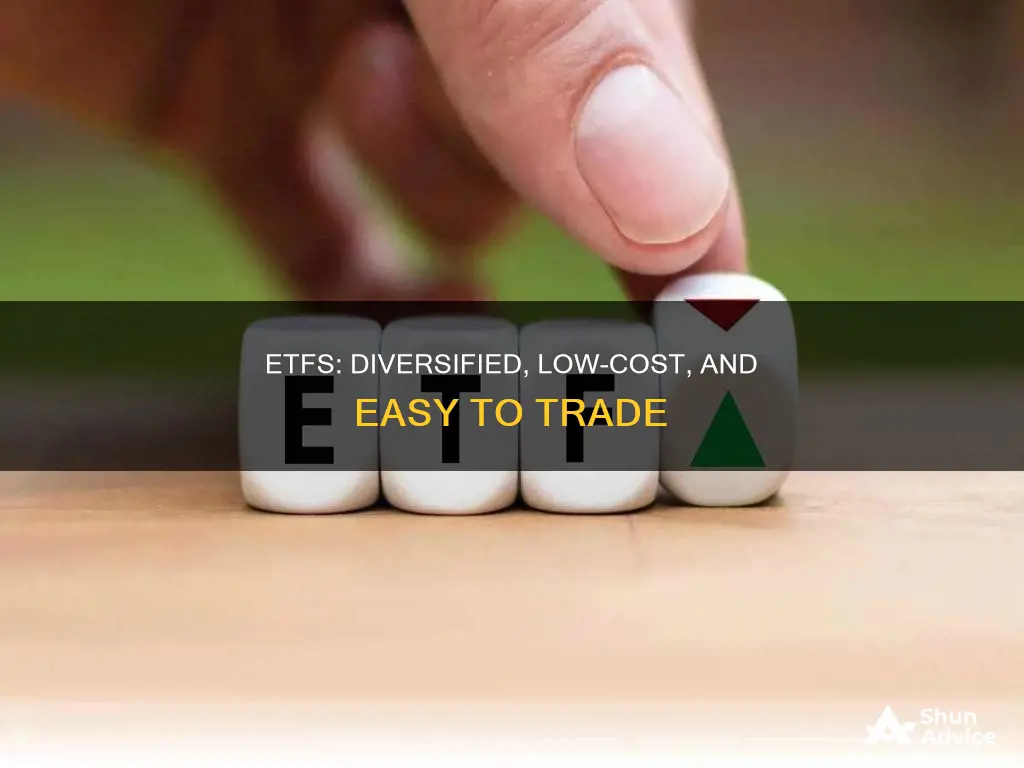
Exchange-traded funds (ETFs) are a popular investment vehicle that pools a group of securities into a fund, which can be traded like an individual stock on an exchange. They are a good investment option because they offer benefits such as diversification, low costs, and the ability to trade shares live during the trading day.
ETFs provide access to many stocks across various industries, low expense ratios, fewer broker commissions, and risk management through diversification. They are also more tax-efficient than mutual funds as most buying and selling occur through an exchange, and they are traded in the markets during regular hours.
Some of the best ETFs on the market include the SPDR S&P 500 ETF, iShares Core S&P 500 ETF, Vanguard S&P 500 ETF, and Invesco QQQ Trust ETF. These ETFs have low expense ratios, strong long-term performance, and provide investors with a diversified portfolio of securities.
Overall, ETFs are a good choice for beginners and experienced investors who want to invest in a diversified portfolio of securities with low costs and the ability to trade shares live.
| Characteristics | Values |
|---|---|
| Accessibility | Minimum investment of $1 |
| Liquidity | Easily convertible to cash |
| Diversification | Low risk due to diversification |
| Cost | Low expense ratios, fewer broker commissions, no sales loads |
| Performance | Competitive long-term returns |
| Tax efficiency | More tax-efficient than mutual funds |
| Management | Passively managed, actively managed |
| Trading | Trade like individual stocks during market hours |
What You'll Learn
- ETFs are a low-cost way to invest in a diverse range of stocks and bonds
- They are traded like stocks on an exchange, offering real-time pricing
- ETFs are a safer investment option than individual stocks due to diversification
- They are a good choice for beginners as they don't require in-depth knowledge of financial markets
- ETFs are tax-efficient, with most trying to track an index like the S&P 500

ETFs are a low-cost way to invest in a diverse range of stocks and bonds
Exchange-traded funds (ETFs) are a great way to invest in a diverse range of stocks and bonds at a low cost. They are a collection of hundreds or thousands of stocks or bonds in a single fund that trades on major stock exchanges.
ETFs have lower expense ratios than other funds. The average ETF expense ratio is 0.05% compared to the industry average of 0.22%. This means that for every $10,000 invested, you would pay $5 in fees for an ETF, compared to $22 for the industry average.
ETFs also offer competitive long-term returns. Over the past 10 years, 83% of Vanguard ETFs beat the returns of their peer-group averages. They also have no taxable capital gains distributions, which means you won't have to pay taxes on any profits made from selling your ETF shares.
Another benefit of ETFs is that they are traded on stock exchanges, so you can buy and sell them at any time during the trading day. This gives you more flexibility and control over your investments.
Overall, ETFs are a great way to invest in a diverse range of stocks and bonds at a low cost. They offer many benefits such as low fees, competitive returns, and the ability to trade at any time during the trading day.
Smart Mutual Fund Investments: 5K and Beyond
You may want to see also

They are traded like stocks on an exchange, offering real-time pricing
Exchange-traded funds (ETFs) are traded on an exchange, like the New York Stock Exchange, in the same way as stocks. This means that investors can buy and sell ETFs throughout the trading day, benefiting from real-time pricing.
ETFs are bought and sold on an exchange during market hours, and their share prices fluctuate throughout the day as the ETF is bought and sold. This is in contrast to mutual funds, which are traded only once a day after the market closes.
ETFs can be bought and sold on most online investing platforms, retirement account provider sites, and investing apps, often with no commission fees. To invest in an ETF, an investor will first need to open a brokerage account and then place an order with their broker.
ETFs are a good choice for beginners as they are a low-cost way to gain exposure to a wide variety of stocks and benefit from diversification.
Mutual Fund Investments: Reporting 1099-INT Details
You may want to see also

ETFs are a safer investment option than individual stocks due to diversification
ETFs: A Safer Investment Option Than Individual Stocks
Exchange-Traded Funds (ETFs) are a safer investment option than individual stocks due to their inherent diversification. This diversification benefit stems from the fact that ETFs are bundles of various assets, including stocks, bonds, commodities, and currencies, providing investors with exposure to a wide range of securities in a single fund.
Reduced Risk and Volatility
The primary advantage of ETFs over individual stocks is the reduced risk and volatility that comes with diversification. When investing in individual stocks, your returns are dependent on the performance of a single company, which can be highly volatile and subject to significant price swings. On the other hand, ETFs provide a more stable investment option as they consist of multiple assets, lowering the impact of any single security on the overall performance of the fund. This diversification benefit is especially prominent in industry or sector-specific ETFs, where the performance is tied to the broader industry or sector rather than individual companies.
Access to a Variety of Assets
ETFs offer investors access to a diverse range of assets and investment strategies. For instance, investors can choose from a wide array of equity ETFs, bond ETFs, commodity ETFs, currency ETFs, and more. This allows investors to tailor their investments to their specific needs and goals, whether they seek income generation, speculation, price increases, or risk hedging.
Lower Expenses and Broker Commissions
ETFs also tend to have lower expense ratios and broker commissions compared to buying individual stocks. The expense ratio of an ETF reflects the cost of operating and managing the fund, and due to their passive nature, ETFs generally have lower expenses than actively managed mutual funds. Additionally, since ETFs trade like individual stocks, they often have lower broker commissions associated with them.
Enhanced Liquidity
Another advantage of ETFs is their liquidity, which refers to the ease of converting the investment into cash. ETFs can be bought and sold on exchanges during market hours, providing investors with greater flexibility and control over their investments.
Suitability for Beginners
The diversification, low costs, and ease of trading make ETFs an attractive option for beginner investors who may not have extensive knowledge of the markets or the time to conduct in-depth research. ETFs allow beginners to gain exposure to a variety of assets and reduce their risk by investing in a diversified fund rather than individual stocks.
Downsides of ETFs
While ETFs offer numerous benefits, it is important to consider some potential drawbacks. ETFs may have higher management fees compared to some mutual funds, and they may not provide the same level of control over specific stock selections as individual stocks do. Additionally, the performance of an ETF depends on the weighted average performance of its underlying assets, so ETFs will never be the highest-performing investments.
In conclusion, ETFs are a safer investment option than individual stocks due to their inherent diversification, reduced risk and volatility, access to a variety of assets, lower expenses, and enhanced liquidity. They are particularly well-suited for investors seeking a more stable and convenient way to invest across different asset classes without incurring high costs.
Emergency Fund Strategies: Where to Invest for Peace of Mind
You may want to see also

They are a good choice for beginners as they don't require in-depth knowledge of financial markets
Exchange-traded funds (ETFs) are a good choice for beginners as they don't require in-depth knowledge of financial markets. They are a collection of hundreds or thousands of stocks or bonds in a single fund that trades on major stock exchanges, like the New York Stock Exchange, Nasdaq, and Chicago Board Options Exchange.
ETFs are a good choice for beginners because they offer instant diversification at a low cost. They are also traded in the markets during regular hours, just like stocks, which means they can be bought and sold throughout the trading day. This makes them more liquid than other investment options.
Additionally, ETFs are managed by experts, and they have lower expense ratios than other investment options. The average ETF expense ratio is 0.05% compared to the industry average of 0.22%. This means that for every $10,000 invested, you would pay $5 annually for an ETF compared to $22 for the industry average.
ETFs are also a good choice for beginners because they are straightforward and proven methods of investing. For example, the S&P 500 index fund is a popular ETF that tracks the performance of the S&P 500 index, which is made up of 500 of the largest US companies. This means that by investing in this ETF, you get instant diversification across a broad range of companies and sectors.
Overall, ETFs are a good option for beginners as they offer a simple, low-cost way to invest in a diversified portfolio of stocks or bonds without requiring in-depth knowledge of financial markets.
UK Pension Funds: Where Is Your Money Invested?
You may want to see also

ETFs are tax-efficient, with most trying to track an index like the S&P 500
Exchange-traded funds (ETFs) are a type of index fund that can be bought and sold like an individual stock on an exchange. They are considered tax-efficient because they have fewer "taxable events" than traditional mutual funds. ETFs are structured to minimise taxes for the holder, resulting in a lower tax bill than a similar mutual fund.
ETFs are designed to track an index, such as the S&P 500, by replicating its holdings. This passive investment strategy means ETFs do not trade in and out of securities as often as an active fund, reducing taxable gains. When an ETF manager sells a security, they can choose from hundreds or thousands of lots to sell the one with the lowest tax implications.
ETFs also benefit from the way they are traded. When you sell shares of an ETF, you are selling to another buyer, not the fund company. This means the fund itself usually isn't involved in the transaction and doesn't have to sell any securities, potentially triggering capital gains.
ETFs are also more tax-efficient than mutual funds because they use creation units to accommodate investment inflows and outflows. This means ETFs usually don't generate the capital gains distributions that mutual funds do, and therefore don't see the tax effects of those distributions.
The majority of ETFs are passively managed, which creates fewer transactions and taxable events. In contrast, mutual funds are actively managed, with fund managers buying and selling securities at their discretion, triggering taxable events.
ETFs are considered a good investment choice, especially for beginners, because they are tax-efficient, low-cost, and low-risk due to their diversification.
Gold Mutual Funds: Best Investment Options for You
You may want to see also







